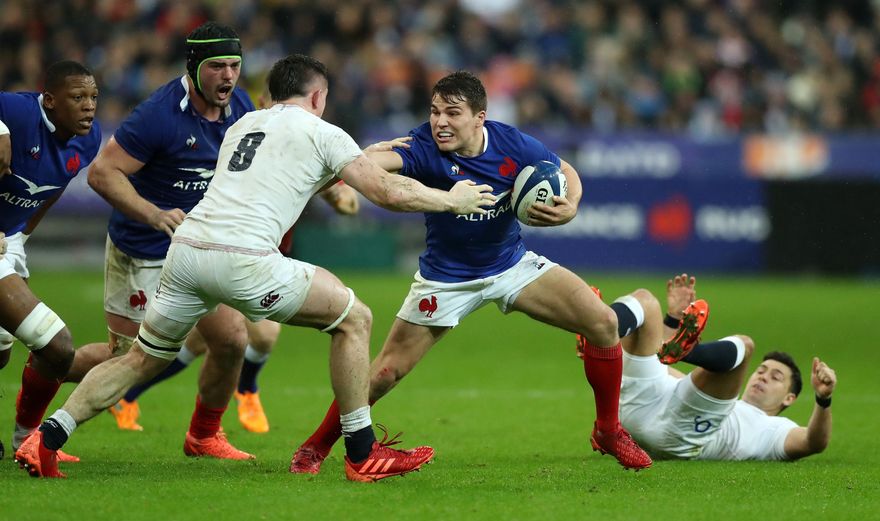In 1900, rugby union made its big entry into the Olympic programme. A mini tournament was organised in Paris for the second edition of the modern Olympic Games, and France became the first nation to be crowned Olympic rugby champions; so it came to pass that six years before the first official "Le Crunch", the seeds of Franco-British rivalry were planted.
The Olympic rugby tournament took place in two rounds: Sunday, 14 October and 28 October; France, captained by the legendary Frantz Reichel, became the first Olympic champions of rugby by beating the German team Frankfurt FC 27-17 and Britain's Moseley Wanderers 27-8 respectively. Here are five lesser known facts about the encounter.
1. The winners didn't just receive a medal

France was awarded the gold medal, while the teams representing Germany and England shared the silver medal; there was no bronze medal. However, this was not the only difference to how winners are declared – and rewarded – at the Olympics today.
While the International Olympics Committee still does not give out prize money to winning athletes and teams, in 1900 the players received something else which might have made the journey home a little tricky had the winners not played for local Parisian teams.
In the regulations, it was stipulated: “in each match, the winning team will receive an art object; in addition, all players who took part in one of the matches will receive a souvenir”.
2. The match took place at a velodrome
Built in 1894 prior to the Universal Exhibition, the Vincennes Velodrome became the main stadium for many for the 1900 Olympics in Paris. Cycling, cricket, football, gymnastics and rugby events all took place there. The velodrome was later renamed "Velodrome Jacques-Anquetil" in 1987.
The real first test between the two official national teams meanwhile took place on 22 March, 1906, once again in Paris, but at the Parc des Princes. To date, 106 games between England and France have been played.
3. Some of the British team played twice that weekend – in two countries
Absent from the Saint-Louis Games in 1904 and Stockholm in 1912, rugby was played between just two teams in 1908 and 1920. The 1900 Olympic tournament however brought together three teams, representing three countries. Great Britain sent a Birmingham club, Moseley Wanderers, while Germany sent FC Frankfurt. France was represented by players from three clubs, all based in Paris: the Stade Français, the Racing club de France and the Cosmopolitan Club.
They may not all have been equally well rested beforehand, however. As the Times wrote in its 29 October, 1900 edition, the reason for the fatigue of the British players, and subsequent loss was a rather busy schedule that weekend. "The fatigue of the team is indisputable as at least five (...) had played for their clubs the day before. The possible itinerary in the 24 hours before kicking off in Paris could have been: Saturday: matches in the Midlands, train to London, and train to the coast. Sunday: cross-Channel steamer, train to Paris." Indeed, it's not clear that all the players even knew they were competing in an Olympic event!
4. The first Olympic "Crunch" was surprisingly lucrative

The England versus France match was the most successful of the 1900 Paris Olympics. In an official report, Daniel Mérillon, the director-general of the Exposition Universelle, which organised the 1900 Olympics, wrote: “The total number of spectators exceeded 6,000, that of paying entries was 3,795 for places of 0.50 Frs, 594 for places of 2 Frs, that is to say a total of 4,389 paying persons having provided a receipt of 3,126 francs ”.
The match was successful and generated a net profit of 1,600 Frs; the Franco-German match having generated a profit of 800 Frs, the whole tournament brought in 2,400 francs net in total.
Only two meetings took place: France v Germany (victory for the French 27-17) and France v England (victory for the French 27-8). The English and the Germans were unable to meet as planned on Sunday, 21 October as the two teams were unable to stay two weeks in Paris to play. For their only meeting, the English players had also made the round trip in one day.
"To reach the population of the eastern suburbs where rugby is not as popular, we had to put the price of seats very low," says Daniel Mérillon in his report. "This proves that the game of rugby foot-ball today has its fans in Paris, which is a great customer base.”
By comparison, only 2,000 spectators attended the two football matches in the Olympics that year.
5. A different point system was used
At that time, the point system was slightly different from today. A try was worth three points, a conversion was worth two points, a penalty was worth three points and a drop was four points.
Six tries were scored by the French in the first half by Émile Sarrade, Joseph Olivier, Jean Collas and Jean-Guy Gautier in the first period: Léon Binoche and Frantz Reichel in the second half. On the English side, Joseph Wallis scored the only try for his team.
Crédit photos : Comité International Olympique
Read more: Le Crunch: What is it? Where is it? And who wins it?






